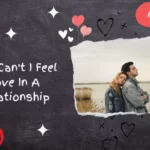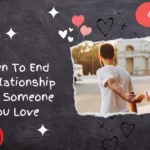Embarking on a new relationship is an exciting journey filled with shared moments and growing intimacy. As you navigate the intricate dance of emotions, a pivotal question arises: when is the perfect time to profess your love?
In the enchanting realm of love, timing holds significant sway. Recognizing that transformative moment when your heart overflows affectionately is thrilling and nerve-wracking. Do you express your feelings openly or savour the emotions a bit longer?
In this blog post, we delve into the intricacies of when to say “I love you” in a relationship. Uncover the signs, emotions, and ideal moments that pave the way for this profound declaration. Striking the right balance between expressing your feelings and respecting your partner’s pace is a delicate art, and we’re here to guide you through it.
As a bonus, explore our Love Calculator tool, which is designed to quantify the magic. Check the percentage of love between you and your special someone – whether it’s a crush, girlfriend, boyfriend, or spouse. Let’s navigate the beautiful love landscape together, ensuring your expressions are as genuine and well-timed as your feelings.
Romantic Ways to Say I Love You for the First Time

Embarking on the journey of expressing your love for the first time is thrilling and nerve-wracking. Finding the right words to convey the depth of your emotions can be a delightful challenge. If you’re pondering romantic ways to say “I love you” for the first time, we’ve got you covered.
Consider starting with a touch of nostalgia. Recall the moments you’ve shared and let the memories pave the way. Saying, “I love you, just like I loved our first date,” adds a sentimental touch that lingers in the heart.
For a playful approach, engage in a shared activity or hobby. Let the natural connection guide your words, whether it’s a favourite board game or a stroll. A casual “I love the way we laugh together during these moments” can infuse romance into the simplicity of everyday life.
Expressing love through written words can be timeless. Penning a heartfelt letter or note lets you articulate your feelings with thought and care. Consider slipping a sweet message like, “In every word I write, there’s an ‘I love you’ hidden just for you.”
Sometimes, actions speak louder than words. Plan a surprise that reflects your partner’s interests. Whether it’s cooking their favourite meal or creating a cosy movie night, let your gestures echo your heart’s sentiment.
Remember, the key is authenticity. Speak from your heart, and choose a moment that feels right for both of you. The beauty of expressing love lies in the sincerity of your emotions. So, embrace the moment’s magic and let those three words weave a new chapter in your love story.
When is the Right Time to Say I Love You to Your Boyfriend?
Navigating the right time to say “I love you” to your boyfriend is a unique journey for every couple. While there’s no one-size-fits-all answer, here are some considerations to help you determine when the time might be right:
1. Connection and Comfort
Gauge the depth of your emotional connection. If you both feel comfortable being vulnerable and open with each other, it may be a good sign that love is in the air.
2. Mutual Feelings
Pay attention to your boyfriend’s actions and words. If he expresses affection, care, and interest in your well-being, it might indicate a readiness for the “L” word.
3. Time Invested
Consider the duration of your relationship. While there’s no strict timeline, being together for a substantial amount of time allows you to understand each other honestly.
4. Shared Experiences
The quality and variety of shared experiences can contribute to the right moment. If you’ve faced challenges together and become stronger, it could be an opportune time to express your love.
5. Communication
Open communication is crucial. If you’ve discussed your feelings and intentions in the relationship, it creates a foundation for expressing love. It’s beneficial to be on the same page.
6. Comfortable Environment
Choose a setting where you both feel at ease. Whether it’s a quiet moment at home or a special place you both cherish, the environment can enhance the sincerity of your words.
7. Your Readiness
Ensure you feel emotionally ready to say, “I love you.” Your feelings must be genuine and not influenced by external pressures.
8. Spontaneity vs. Planned
Some couples prefer spontaneous declarations, while others appreciate more planned and thoughtful moments. Consider your boyfriend’s personality and what would resonate best with him.
Remember, there’s no rush; expressing love should feel natural and authentic. Trust your instincts, be attuned to your partner’s cues, and choose a moment that feels right for both of you. Ultimately, the right time is when the words genuinely reflect your feelings and the dynamics of your relationship.
When Should I Say I Love You in a Long-Distance Relationship?
Expressing “I love you” in a long-distance relationship involves a unique set of considerations due to the physical separation. Here are some factors to help you determine the right time to say “I love you” in a long-distance relationship:
1. Established Emotional Connection
In a long-distance relationship, building a solid emotional connection is crucial. The foundation of love often grows from shared experiences, deep conversations, and a sense of understanding. Wait until you both feel a solid emotional bond.
2. Quality Communication
Effective communication is the lifeline of long-distance relationships. Consistent engaging in meaningful conversations and openly sharing your thoughts and feelings may create an environment where expressing love feels natural.
3. Time and Patience
Long-distance relationships require time and patience. Before saying “I love you,” ensure that you’ve given the relationship sufficient time to develop and that both partners are comfortable with the pace of emotional intimacy.
4. Visitations and Shared Moments
If possible, spend time together in person. Face-to-face interactions can strengthen your emotional connection. Sharing physical moments, even infrequent, can provide a foundation for expressing love.
5. Consistency in Feelings
Assess the consistency of your feelings and those of your partner. In a long-distance relationship, it’s essential that both individuals feel a sustained and mutual connection before taking the step to say, “I love you.”
6. Discussing the Future
Suppose you’ve had conversations about the future of your relationship, including plans to close the distance eventually. In that case, it may indicate that both of you are committed to the relationship’s long-term success.
7. Spontaneous vs. Planned Expression
Decide whether a spontaneous expression of love or a more planned and intentional moment aligns with your relationship dynamics. Some couples appreciate the surprise of spontaneity, while others find comfort in a carefully planned moment.
8. Understanding Your Partner’s Comfort Level
Be attuned to your partner’s comfort level. They may be ready to hear and reciprocate those three crucial words if they have expressed vulnerability and openness.
Ultimately, the right time to say “I love you” in a long-distance relationship is when both partners feel a deep emotional connection and are ready for the declaration to enhance and deepen their bond. Trust and communication play pivotal roles in determining this readiness.
When Saying I Love You in a Relationship, Quotes
Expressing love in a relationship can be beautifully enhanced with thoughtful quotes. Here are some quotes that capture the essence of saying “I love you” in a relationship:
- “I love you not because of who you are, but because of who I am when I am with you.” – Roy Croft
- “In all the world, there is no heart for me like yours. In all the world, there is no love for you like mine.” – Maya Angelou.
- “I saw that you were perfect, and so I loved you. Then I saw that you were imperfect, and I loved you even more.” – Angelita Lim.
- “I love you without knowing how, or when, or from where. I love you, without problems or pride.” – Pablo Neruda.
- “You don’t love someone for their looks, or their clothes, or their fancy car, but because they sing a song only you can hear.” – Oscar Wilde.
- “To love and be loved is to feel the sun from both sides.” – David Viscott
- “I love you because the entire universe conspired to help me find you.” – Paulo Coelho
- “Being deeply loved by someone gives you strength while loving someone deeply gives you courage.” – Lao Tzu
- “I love you more than I have ever found a way to say to you.” – Ben Folds
- “When I say I love you more, I don’t mean I love you more than you love me. I mean, I love you more than the bad days ahead of us; I love you more than any fight we will ever have.” – Unknown
Feel free to choose a quote that resonates with the emotions you want to convey in your relationship. Quotes can add a touch of eloquence and depth to the expression of love.
When to Say I Love You in a Relationship After?
In a relationship, deciding when to say “I love you” is like finding the perfect moment to share your most treasured feelings. It’s not about rushing but about letting your emotions unfold naturally. Here’s a heart-touching guide to help you navigate this beautiful milestone.
1. Connection Beyond Words:
Before saying those three magical words, make sure you share a connection that goes beyond spoken language. It’s about understanding each other’s quirks, dreams, and fears.
2. Moments That Speak:
Look for those moments when words aren’t necessary. It could be a shared laugh, a comforting gesture, or a look that lingers a bit longer. These are the unspoken cues that love is flourishing.
3. Trust Your Heart:
Listen to your heart—it often knows when the time is right. If you feel warmth and comfort in your partner’s presence, if their happiness becomes intertwined with yours, it might be the perfect moment.
4. Shared Experiences:
Create memories together. Whether it’s overcoming challenges or celebrating victories, shared experiences deepen your connection. Saying “I love you” after navigating life’s journey together adds more meaning.
5. Understanding Each Other’s Pace:
People express love in different ways and at different paces. Respect your partner’s pace and ensure they are comfortable sharing such a significant declaration.
6. Feeling Secure:
A healthy relationship is built on a foundation of security. Ensure that both of you feel secure and valued in the relationship before leaping expressing love.
7. Moments of Vulnerability:
Vulnerability is the bridge to deep emotional intimacy. If you and your partner have shared moments of vulnerability, it can signify that you are ready to express your love openly.
8. Celebrate Uniqueness:
Embrace the uniqueness of your relationship. There’s no universal timeline for saying “I love you.” Let your journey unfold at its own pace, and cherish the individuality of your love story.
9. The Power of Listening:
Pay attention to what your partner shares about their feelings. They might give you clues about their readiness to hear and reciprocate those three special words.
10. Cherish the Moment:
When the moment finally arrives, cherish it. Make it special, whether it’s a quiet evening, a shared adventure, or a simple gesture reflecting your feelings’ depth.
Remember, saying “I love you” is a personal and unique experience for every couple. Trust the rhythm of your relationship, and when the time feels right, let your heart do the talking.
Signs It’s the Right Time to Say, “I Love You”

Determining the right time to say “I love you” in a relationship can be both thrilling and nerve-wracking. Here are some signs that may indicate it’s the perfect moment to express those three significant words:
1. Deep Emotional Connection
You feel a profound emotional bond with your partner, where sharing thoughts, fears, and dreams comes naturally.
2. Comfort and Vulnerability
Both you and your partner are comfortable being vulnerable with each other, and there’s a sense of security in sharing your true selves.
3. Shared Experiences
You’ve navigated through various experiences together, whether joyful or challenging, and these shared moments have strengthened your connection.
4. Mutual Affection
Your partner consistently shows affection, care, and interest in your well-being. They may express their feelings through actions and words.
5. Communication is Open and Honest
Open and honest communication is a cornerstone of your relationship. You’ve discussed your feelings, intentions, and the future together.
6. Time Invested in the Relationship
You’ve been together long enough to understand each other’s quirks, habits, and values. There’s a sense of familiarity and comfort.
7. Positive Changes in Behavior
You notice positive changes in your partner’s behavior, such as increased attentiveness, consideration, and a desire to make you happy.
8. Natural Progression of the Relationship
Your relationship has naturally progressed to a point where expressing love feels like the next step in the journey.
9. Feeling a Sense of Oneness
You no longer see the relationship as “you” and “me” but as an “us.” There’s a sense of unity and oneness in your shared experiences.
10. Your Instincts Tell You It’s Right
Trust your instincts. If you feel a strong, positive gut feeling that it’s the right time to say “I love you,” it likely is.
11. Discussing Future Plans
Conversations about the future, including plans as a couple, are happening naturally, indicating a shared commitment to the relationship.
12. Respect for Each Other’s Pace
Both partners respect each other’s pace in the relationship, understanding that emotional milestones may be reached at different times.
Remember, every relationship is unique, and there’s no specific timeline for expressing love. Pay attention to these signs, but ultimately, choose a moment that feels authentic and right for both you and your partner.
Finding the Right Moment

Finding the right moment to express your feelings can be a crucial step in any relationship. Here are some tips to help you discover that perfect moment:
1. Natural Flow of Conversation
Look for moments when you are engaged in a natural and meaningful conversation. When the discussion feels effortless, it might be an ideal time to express your feelings.
2. Shared Activities
Engage in activities you both enjoy. Whether it’s a shared hobby, a quiet evening, or an adventurous outing, the right moment often arises when you’re enjoying each other’s company.
3. Intimate Settings
Choose settings that foster intimacy and connection. It could be a quiet dinner, a cozy night at home, or a special place that holds sentimental value for both of you.
4. Reflect on Shared Experiences
Reflect on the positive experiences you’ve shared. If you’ve overcome challenges together or celebrated achievements, these moments can serve as a backdrop for expressing your emotions.
5. Pay Attention to Non-Verbal Cues
Pay close attention to non-verbal cues, such as lingering eye contact, shared smiles, or a gentle touch. These cues can indicate a strong emotional connection.
6. Comfort and Relaxation
Choose a time when both of you are relaxed and comfortable. Avoid stressful situations or times when your partner might be preoccupied with other concerns.
7. Meaningful Dates
Consider expressing your feelings on meaningful dates, such as anniversaries, birthdays, or during special occasions. These moments often carry added emotional significance.
8. After a Thoughtful Gesture
If your partner has recently done something special or thoughtful for you, it can be a great time to reciprocate by expressing your love.
9. Celebrate Achievements
Celebrate personal or shared achievements. When you or your partner has accomplished something significant, it creates a positive atmosphere for expressing love.
10. Capture Spontaneous Moments
Sometimes, the most beautiful moments are spontaneous. If you feel a surge of love in a random moment, don’t be afraid to seize the opportunity to express your feelings.
11. Create a Comfortable Environment
Ensure the physical environment is conducive to comfort and openness. This could be a quiet corner, a favorite spot, or a space where you both feel at ease.
12. Trust Your Instincts
Trust your instincts and emotions. If you feel a strong connection and an overwhelming desire to express your love, it’s likely the right moment for you.
Remember, finding the right moment is a personal journey. Consider your partner’s personality, the dynamics of your relationship, and choose a time that feels authentic and sincere for both of you.
Saying “I Love You” Too Early
Expressing love is a beautiful part of a relationship, but saying “I love you” too early can have its challenges. Here are some reasons to be mindful of the timing:
1. Understanding of Love
Ensure both partners have a mutual understanding of what “love” means. Rushing into such a significant declaration without shared expectations can lead to misunderstandings.
2. Building a Foundation
Love often thrives on a foundation of shared experiences, trust, and understanding. Saying it too early may skip the necessary steps of building a solid connection.
3. Potential Pressure
An early “I love you” might unintentionally pressure your partner into reciprocating before they are emotionally ready. It’s essential to respect their pace and feelings.
4. Different Paces
People have different timelines for emotional intimacy. Your readiness to express love may not align with your partner’s pace, leading to potential discomfort.
5. Risk of Misinterpretation
Saying “I love you” too soon may risk misinterpretation. Your partner might wonder if the sentiment is genuine or if it’s driven by infatuation or the desire to move the relationship forward quickly.
6. Development of Emotional Connection
Relationships often benefit from a gradual development of emotional connection. Rushing into deep expressions of love can hinder the natural progression of understanding and appreciation.
7. Potential Impact on the Dynamic
An early declaration might alter the dynamic of the relationship. Your partner may need time to process the information, potentially affecting the dynamics between you.
8. Vulnerability and Comfort
True love is often built on a sense of vulnerability and comfort with your partner. It takes time to reach this level of intimacy, and expressing love prematurely might disrupt this natural process.
9. Risk of Unintended Consequences
An early “I love you” might lead to unintended consequences, such as expectations or fears about the future. It’s crucial to be aware of the potential impact on both individuals.
10. Authenticity of Feelings
Take the time to evaluate the authenticity of your feelings. Are you truly in love, or are you caught up in the excitement of a new relationship? Ensure your emotions are genuine and deep-rooted.
In summary, while expressing love is a beautiful and essential aspect of a relationship, it’s crucial to be mindful of the timing. Building a foundation of trust, shared experiences, and mutual understanding can pave the way for a more meaningful and genuine declaration of love when the time is right for both partners.
What To Do If Your Partner Doesn’t Say “I Love You” Back

Not receiving an “I love you” in return can be challenging, but it’s essential to approach the situation with empathy and understanding. Here’s what you can do if your partner doesn’t say “I love you” back:
1. Give Them Time
People express emotions differently; some may need more time than others to verbalize their feelings. Be patient and allow your partner the space to process and respond in their own time.
2. Communicate Openly
Initiate an open and honest conversation about your feelings. Share why expressing love is essential to you, and ask if there are specific reasons your partner hasn’t said it back. Encourage them to share their thoughts as well.
3. Understand Their Perspective
Your partner may have different experiences, beliefs, or fears about expressing love. Understanding their perspective can help you empathize with their feelings and create a more supportive environment.
4. Explore Their Love Language
People have different love languages—ways they prefer to give and receive love. Your partner might express love through actions, quality time, or other means. Explore their love language and appreciate the unique ways they show affection.
5. Be Supportive
Your partner might be dealing with personal challenges or insecurities that make expressing love difficult. Be supportive and understanding, offering reassurance that you are there for them.
6. Express Your Needs
Clearly communicate your needs in the relationship, including the need for verbal affirmation. Let your partner know that hearing “I love you” is meaningful and contributes to your emotional connection.
7. Don’t Force a Response
Avoid pressuring your partner to say “I love you” back. Love should be freely given and not coerced. Allow the expression of emotions to happen organically.
8. Evaluate the Relationship
Reflect on the overall health of the relationship. While expressing love is important, consider other relationship aspects, such as communication, shared values, and emotional connection.
9. Seek Professional Guidance
If the issue persists and is causing distress in the relationship, consider seeking the guidance of a relationship counsellor or therapist. A neutral third party can provide valuable insights and facilitate communication.
10. Consider the Context
Understand that external factors might influence your partner’s ability to express love. Stress, past experiences, or personal challenges could contribute to their hesitation.
Remember that relationships are a journey, and emotional expressions can evolve. Maintaining open communication, being patient, and working together are crucial to fostering a deeper emotional connection. If both partners are committed to understanding and supporting each other, the relationship can navigate challenges and grow stronger.
Conclusion
In the delightful journey of a relationship, knowing when to say “I love you” is like discovering the perfect melody in the symphony of emotions. As we’ve explored, there’s no universal timeline, and the right moment is deeply personal. It’s about understanding each other, building a connection, and letting love unfold naturally.
Remember, expressing love is more than words; it reflects shared experiences, vulnerability, and a profound emotional bond. The beauty lies in the authenticity of your feelings and the unique dynamics of your connection.
As you navigate the path of love, we invite you to explore our Love Calculator tool. This fun and insightful tool can quantify the magic by calculating the percentage of love between you and your special someone. It’s a lighthearted way to add a touch of playfulness to your romantic journey.
In the end, cherish the moments, embrace the journey, and let your heart speak when the time feels right. Saying “I love you” is not just a declaration; it’s a celebration of the beautiful connection you’ve built with your partner. May your love story unfold with warmth, joy, and the magic of shared affection.
Frequently Asked Questions about When to Say I Love You?
How long until you say I love you in a relationship?
There’s no fixed timeline. It varies for each couple. Some may say it early on, while others may take more time.
Is 3 months too soon to say I love you?
It depends on the individuals and the depth of the connection. Some may feel ready, while others may need more time.
When a man says I love you first?
There’s no specific rule. Men may say it at different points, influenced by their feelings and the dynamics of the relationship.
How do you know you’re in love?
It involves a deep emotional connection, genuine care, and a sense of understanding. You may feel a warmth and joy in your partner’s presence.
Do I love him or just a crush?
Love involves a deeper connection, while a crush is often more surface-level. Evaluate your emotions, considering depth and longevity.
Is he falling in love with me?
Signs may include increased affection, consideration, and a desire to spend time together. Open communication is key.
How do I know he loves me?
Look for consistent affection, support, and genuine interest in your well-being. Communication and actions often reflect love.
Why is he not confessing his love?
People have different comfort levels. He may need more time or might express love through actions rather than words.
Who usually says I love you first?
There’s no gender rule. Either partner can say it first, and it depends on individual feelings and comfort.
What can I say instead of I love you?
Express your feelings with phrases like “I care about you deeply” or “You mean a lot to me.”
Is it a red flag to say I love you?
Not necessarily. It depends on the context and the genuineness of the feelings expressed.
What is the full form of BF in love?
BF stands for “Boyfriend” in the context of a romantic relationship.
Should I tell him I love him first?
If you genuinely feel ready and the relationship feels right, expressing your feelings first is perfectly okay.
Should a woman say I love you first?
Absolutely. In a relationship, either partner can initiate expressing love based on their feelings and comfort level.
Is 1 month too soon to say I love you?
It depends on the individuals and the nature of the relationship. Some may feel a deep connection early on, while others may take more time. Trust your instincts and the dynamics of your specific relationship.
When to say I love you in a relationship Reddit?
On Reddit, opinions vary. Many suggest waiting until there’s a strong emotional connection and mutual understanding. Some users share their personal experiences and offer advice based on different relationship timelines.








